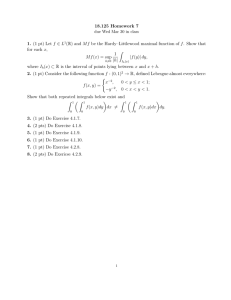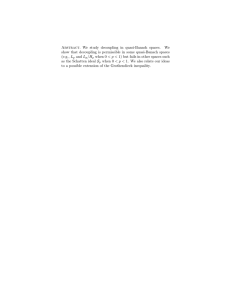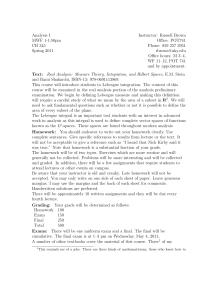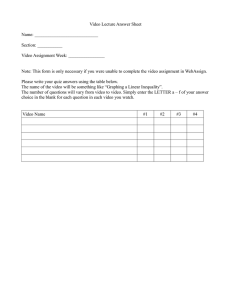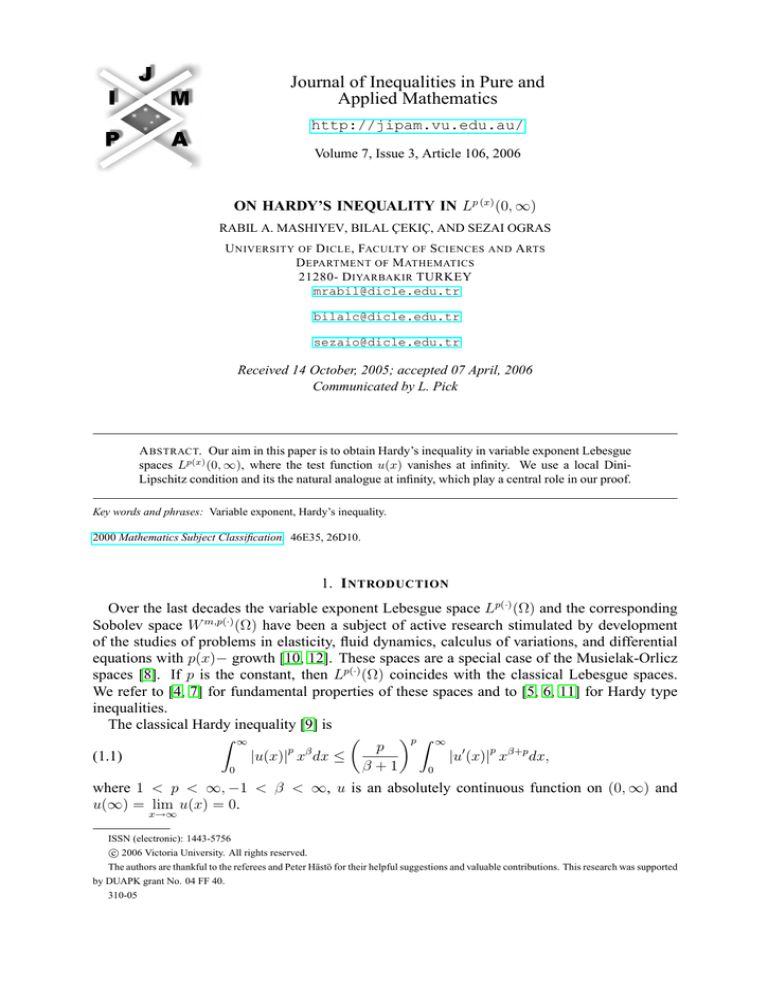
Journal of Inequalities in Pure and
Applied Mathematics
http://jipam.vu.edu.au/
Volume 7, Issue 3, Article 106, 2006
ON HARDY’S INEQUALITY IN Lp (x) (0, ∞)
RABIL A. MASHIYEV, BILAL ÇEKIÇ, AND SEZAI OGRAS
U NIVERSITY OF D ICLE , FACULTY OF S CIENCES AND A RTS
D EPARTMENT OF M ATHEMATICS
21280- D IYARBAKIR TURKEY
mrabil@dicle.edu.tr
bilalc@dicle.edu.tr
sezaio@dicle.edu.tr
Received 14 October, 2005; accepted 07 April, 2006
Communicated by L. Pick
A BSTRACT. Our aim in this paper is to obtain Hardy’s inequality in variable exponent Lebesgue
spaces Lp(x) (0, ∞), where the test function u(x) vanishes at infinity. We use a local DiniLipschitz condition and its the natural analogue at infinity, which play a central role in our proof.
Key words and phrases: Variable exponent, Hardy’s inequality.
2000 Mathematics Subject Classification. 46E35, 26D10.
1. I NTRODUCTION
Over the last decades the variable exponent Lebesgue space Lp(·) (Ω) and the corresponding
Sobolev space W m,p(·) (Ω) have been a subject of active research stimulated by development
of the studies of problems in elasticity, fluid dynamics, calculus of variations, and differential
equations with p(x)− growth [10, 12]. These spaces are a special case of the Musielak-Orlicz
spaces [8]. If p is the constant, then Lp(·) (Ω) coincides with the classical Lebesgue spaces.
We refer to [4, 7] for fundamental properties of these spaces and to [5, 6, 11] for Hardy type
inequalities.
The classical Hardy inequality [9] is
p Z ∞
Z ∞
p
p
p β
(1.1)
|u(x)| x dx ≤
|u0 (x)| xβ+p dx,
β+1
0
0
where 1 < p < ∞, −1 < β < ∞, u is an absolutely continuous function on (0, ∞) and
u(∞) = lim u(x) = 0.
x→∞
ISSN (electronic): 1443-5756
c 2006 Victoria University. All rights reserved.
The authors are thankful to the referees and Peter Hästö for their helpful suggestions and valuable contributions. This research was supported
by DUAPK grant No. 04 FF 40.
310-05
2
R ABIL A. M ASHIYEV , B ILAL Ç EKIÇ , AND S EZAI O GRAS
Kokilashvili and Samko [6] gave the boundedness of Hardy operators with fixed singularity
in the spaces Lp(·) (ρ, Ω) over a bounded open set in Rn with a power weight ρ(x) = |x − x0 |β ,
x0 ∈ Ω̄ and an exponent p(x) satisfying the Dini-Lipschitz condition. The Hardy type inequality
can be derived
β β
p(x) p(x) +1 0 (1.2)
≤ C(p(x), `) x
u
,
x u
p(x),(0,`)
−
p(x),(0,`)
+
where β > −1, 1 < p ≤ p < ∞, ` is a positive finite number, and u is an absolutely continuous function on (0, `) in the Lebesgue space with variable exponent for bounded domains from
Theorem E in [6].
Recently, Harjulehto, Hästö and Koskenoja [5] have obtained the norm version of Hardy’s
inequality using Diening’s corollaries in the variable exponent Sobolev space. Also they have
given a necessary and sufficient condition for Hardy’s inequality to hold.
We consider the problem of the extension of Hardy’s inequality to the case of variable
p(x). Such inequalities with variable p(x) are already known for a finite interval (0, `) in
the one-dimensional case. Our aim in this paper is to obtain a Hardy type inequality in a
one-dimensional Lebesgue space Lp(x) (0, ∞) using a distinct method, by considering relevant
studies in [1] and [6].
2. P RELIMINARIES
Let Ω ⊂ Rn be an open set, p(·) : Ω → [1, ∞) be a measurable bounded function and be
denoted as p+ = esssup p(x) and p− = essinf p(x). We define the variable exponent Lebesgue
x∈Ω
x∈Ω
space L
p(·)
(Ω) consisting of all measurable functions f : Ω → R such that the modular
Z
Ap (f ) :=
|f (x)|p(x) dx
Ω
is finite. If p
Lp(·) (Ω) by
+
< ∞ then we call p a bounded exponent and we can introduce the norm on
kf kp(·),Ω
(2.1)
f
≤1
:= inf λ > 0 : Ap
λ
and Lp(·) (Ω) becomes a Banach space. The norm kf kp(·),Ω is in close relation with the modular
Ap (f ).
Lemma 2.1 ([4]). Let p(x) be a measurable exponent such that 1 ≤ p− ≤ p(x) ≤ p+ < ∞ and
let Ω be a measurable set in Rn . Then,
(i) kf kp(x) = λ 6= 0 if and only if Ap fλ = 1;
(ii) kf kp(x) < 1(= 1; > 1) ⇔ Ap (f ) < 1 (= 1; > 1);
(iii) For any p(x), the following inequalities
+
−
−
+
kf kpp(x) ≤ Ap (f ) ≤ kf kpp(x) ,
and
kf kpp(x) ≤ Ap (f ) ≤ kf kpp(x) ,
kf kp(x) ≤ 1
kf kp(x) ≥ 1
hold.
Lemma 2.2 ([4, 7]). The generalization of Hölder’s inequality
Z
f (x)ϕ(x)dx ≤ c kf k
p(x) kϕkp0 (x)
Ω
0
holds, where p (x) =
p(x)
p(x)−1
and the constant c > 0 depends only on p(x).
J. Inequal. Pure and Appl. Math., 7(3) Art. 106, 2006
http://jipam.vu.edu.au/
H ARDY I NEQUALITY
3
We say that the exponent p(·) : Ω → [1, ∞) is Dini-Lipschitz if there exists a constant c > 0
such that
c
(2.2)
|p(x) − p(y)| ≤
,
− log |x − y|
for every x, y ∈ Ω with |x − y| ≤ 21 . The natural analogue of (2.2) is
c
(2.3)
|p(x) − p(y)| ≤
log (e + |x|)
for every x, y ∈ Ω, |y| ≥ |x| at infinity. Under these conditions, most of the properties of
the classical Lebesgue space can be readily generalized to the Lebesgue space with variable
exponent.
Theorem 2.3 ([5, Theorem 5.2]). Let I = [0, M ) for M < ∞, p : I → [1, ∞) be bounded,
p(0) > 1 and
1
lim sup(p(x) − p(0)) log < ∞
x
x→0+
h
1
and p−
=
p(0)
for
some
x
∈
(0,
1).
If
a
∈
0,
1
−
, then Hardy’s inequality
0
(0,x0 )
p(0)
u(x) (2.4)
≤ C ku0 (x)xa kp(x)
x1−a p(x)
holds for every u ∈ W 1,p(x) (I) with u(0) = 0.
Throughout this paper, we will assume that p(x) is a measurable function and use this notation
kf kp(x) := kf kp(x),(0,∞) .
Moreover, we will use c and ci as generic constants, i.e. its value may change from line to line.
3. M AIN R ESULT
Theorem 3.1. Let β > −1 and p : (0, ∞) → (1, ∞) be such that 1 ≤ p− ≤ p+ < ∞ and
(3.1)
|p(x) − p(y)| ≤
c
,
− log |x − y|
1
|x − y| ≤ ,
2
x, y ∈ R+ .
Assume that there exists a number p(∞) ∈ [1, ∞) and a ≥ 1 such that
c
(3.2)
0 ≤ p(x) − p(∞) ≤
,
x ≥ a.
log(e + x)
Then, we have
β
p(x)
x u(x)
(3.3)
p(x)
β
p(x) +1 0 ≤ c x
u (x)
p(x)
for every absolutely continuous function u : (0, ∞) → R with u(∞) = 0.
Proof. To prove this inequality it suffices to consider the case
β
p(x) +1 0 u (x)
=1
x
p(x)
for a monotone decreasing function u. Using Hölder’s inequality, we obtain
Z ∞
β
β
(3.4)
u(a) = −
u0 (t)dt ≤ ckt p(t) +1 u0 (t)kp(t),(a,∞) kt− p(t) −1 kp0 (t),(a,∞) ≤ c1 ,
a
J. Inequal. Pure and Appl. Math., 7(3) Art. 106, 2006
http://jipam.vu.edu.au/
4
R ABIL A. M ASHIYEV , B ILAL Ç EKIÇ , AND S EZAI O GRAS
p(x)
, and the positive constant c1 depends only on p(x) and β. Since u(x) ≤ c1
where p0 (x) = p(x)−1
for (0, ∞), using Hardy’s inequality for the fixed exponent p(∞) we have
Z ∞
Z ∞
Z ∞
p+
β
p(x)
β
p(∞)
(3.5)
x u(x) dx ≤ c2
x u(x)
dx ≤ c3
xβ (−xu0 (x))p(∞) dx.
a
a
a
If we divide the interval (a, ∞) into three sets such that
A = {t ∈ (a, ∞) : t|u0 (t)| > 1},
B = {t ∈ (a, ∞) : t−β−2 < t|u0 (t)| ≤ 1},
C = {t ∈ (a, ∞) : t|u0 (t)| ≤ t−β−2 },
then we can write
Z ∞
Z
Z
Z
β
0
p(∞)
β
0
p(∞)
β
0
p(∞)
t |tu (t)|
dt =
t |tu (t)|
dt +
t |tu (t)|
dt +
tβ |tu0 (t)|p(∞) dt.
a
A
B
C
Now, let us estimate each integral. It is easy to see that
Z
Z ∞
β
0
p(∞)
t |tu (t)|
dt ≤
tβ |tu0 (t)|p(t) dt ≤ 1
A
and
Z
a
0
β
p(∞)
t |tu (t)|
Z
dt ≤
C
β −β−2
t t
Z
dt ≤
C
∞
tβ t−β−2 dt ≤ c.
a
Since
t(β+2)(p(t)−p(∞)) = (tp(t)−p(∞) )β+2
1 β+2
≤ t log(e+t)
log t β+2
≤ e log(e+t)
≤ eβ+2 ,
we have
Z
β
0
p(∞)
t |tu (t)|
Z
dt ≤
B
p(t)−p(∞) 0 p(∞)
tβ tβ+2 |tu0 (t)|
|tu (t)|
dt
ZB∞
t(β+2)(p(t)−p(∞)) tβ |tu0 (t)|p(t) dt
a
Z ∞
β+2
≤e
tβ |tu0 (t)|p(t) dt
≤
a
≤ eβ+2 .
Hence, we obtain
∞
Z
tβ |u(t)|p(t) dt ≤ c.
(3.6)
a
On the other hand, by using inequality (1.2) and the assumption (3.1) for the interval (0, a), we
can write
Z a
(3.7)
tβ |u(t)|p(t) dt ≤ c.
0
Combining inequalities (3.6) and (3.7), we get
Z ∞
tβ |u(t)|p(t) dt ≤ c
0
J. Inequal. Pure and Appl. Math., 7(3) Art. 106, 2006
http://jipam.vu.edu.au/
H ARDY I NEQUALITY
5
and hence from the relation between norm and modular we have
β
kt p(t) u(t)kp(t) ≤ c.
(3.8)
Consequently, we have the required result from (3.8) for
u(t)
β
p(t) +1 0 .
u (t)
t
p(t)
R EFERENCES
[1] C. CAPONE, D. CRUZ-URIBE AND A. FIORENZA, The fractional maximal operator on variable
Lp spaces, Rapporto Tecnico 281/04, May 2004 (preprint). [ONLINE: http://www.na.iac.
cnr.it/rapporti]
[2] L. DIENING, Maximal functions on generalized Lebesgue spaces Lp(·) , Math. Inequal. Appl., 7(2)
(2004), 245–254.
[3] L. DIENING, Riesz potential and Sobolev embeddings of generalized Lebesgue and Sobolev
spaces Lp(·) and W k,p(·) , Math. Nachr., 263(1) (2004), 31–43.
[4] X.-L. FAN AND D. ZHAO, On the spaces Lp(x) (Ω) and W k,p(x) Ω, J. Math. Anal. Appl., 263 (2001),
424–446.
[5] P. HARJULEHTO, P. HÄSTÖ AND M. KOSKENOJA, Hardy’s inequality in variable exponent
Sobolev spaces, Georgian Math. J., 12(3) (2005), 431–442.
[6] V. KOKILASHVILI AND S. SAMKO, Maximal and fractional operators in weighted Lp(x) Spaces,
Rev. Mat. Iberoamericana., 20(2) (2004), 493–515.
[7] O. KOVÁČIK AND J. RÁKOSNÍK, On the spaces Lp(x) (Ω) and W 1,p(x) (Ω), Czech. Math. J., 41
(116) (1991), 592–618.
[8] J. MUSIELAK, Orlicz Spaces and Modular Spaces, Springer-Verlag , Berlin, 1983.
[9] B. OPIC
(1990).
AND
A. KUFNER, Hardy-type Inequalities, Longman Scientific & Technical, Harlow,
[10] M. RŮŽIČKA, Electrorheological Fluids: Modeling and Mathematical Theory, Springer-Verlag,
Berlin, 2000.
[11] S. SAMKO, Hardy inequality in the generalized Lebesgue spaces, Fract. Calc. Appl. Anal., 6(4)
(2003), 355–362.
[12] V.V. ZHIKOV, Averaging of functionals of the calculus of variations and elasticity theory, Math.
USSR-Izv., 29(1), 33–66. [Translation of Izv. Akad. Nauk SSSR Ser. Mat., 50(4), 675–710, 877.]
J. Inequal. Pure and Appl. Math., 7(3) Art. 106, 2006
http://jipam.vu.edu.au/

